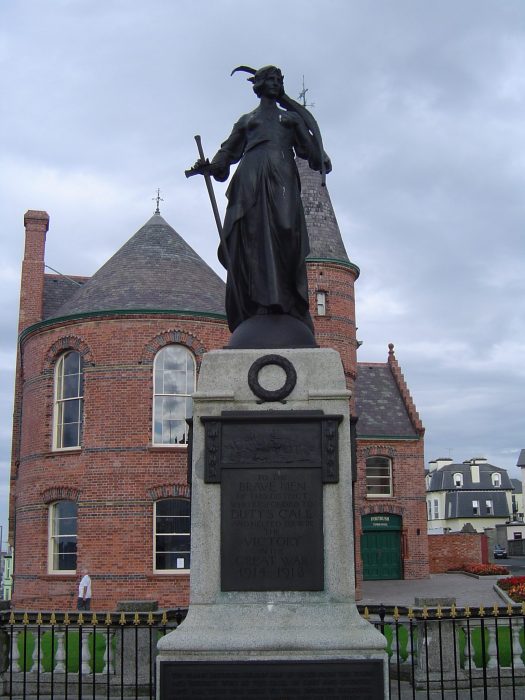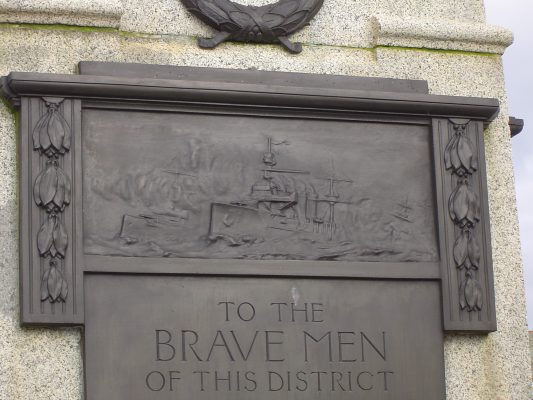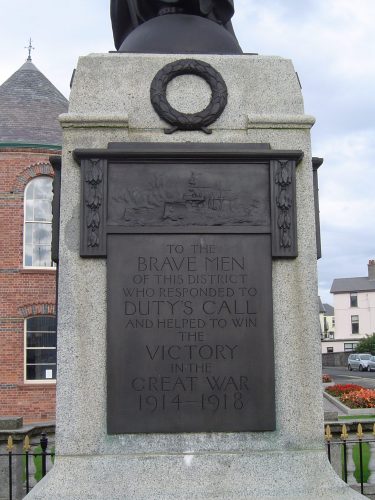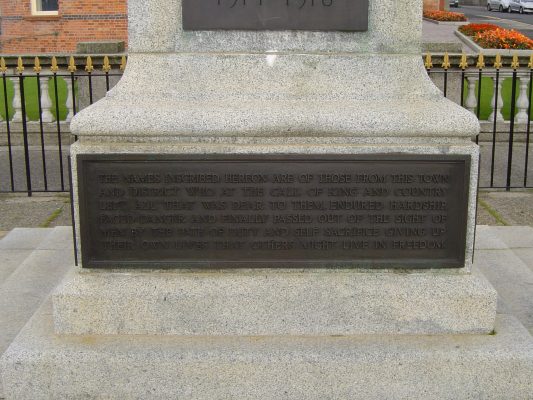



PORTRUSH, Co. Antrim.
The Names of the FALLEN 1914 - 1918.
Hazlett Samuel Allison,
Bernard Stuart Anderson.
William James Bacon,
John Bacon.
William John M’Clelland Cameron,
George Christy,
Alexander Clarke,
Alex. Campbell Coburn,
James Conner,
John Conner.
Norman Davison,
Joseph Diamond,
Joseph Diamond, jun.
William James Eason,
Jesse Edgar,
William Elkin.
William Fall,
John Foreman, jun.,
William James Frazer.
David Simpson Gilfillan,
William Govan.
Hugh Benjamin Haslam,
Daniel Henry,
Joseph Henry,
James Hopkins,
James Hunter.
Thomas Irwin.
John Kane,
James Kane.
William Law,
Henry Robert Leech.
Samuel James Macfarlane,
Andrew M’Millan, jun.,
William Jubilee Maxwell,
John Herbert Wilson Millar,
Joseph Miller,
Robert John Morrow,
David Waldo Mullan,
Charles Stevenson Murray,
Matthew Murray,
Samuel M’Caw,
Edward Alexander M’Clatchie,
Archibald M’Farlane,
Robert M’Fetridge,
Henry M’Cormick,
John M’Gowan,
James M’Grattan,
John M’Grattan,
John M’llree, jun.,
James M’Mullan,
James M’Mullan,
James M’Mullan,
John Campbell M’Mullan,
Andrew M’Neill,
George M’Neill.
Samuel Nicholl,
John North.
Robert Forsythe Pepper,
Edward Leo Phair.
Henry Jeffrey Robinson Quigley.
James George Rankin,
John Edward Riddell,
Samuel Ross, jun.,
Jack Russell.
David Sinclair,
Thomas Smith,
Frederick Robert Smyth,
John Charles Martin Smyth,
Samuel Smyth,
John Stewart,
Charles Maitland Stuart.
William Thorpe,
John Tosh.
Hugo Burr Craig Watt,
Joseph Alex. Watt.
The Names of the FALLEN 1939 - 1945.
John Beckett
James H. Bell
Thomas McC. Campbell
William A. Campbell
Terence C. Clarke
Thomas J. Davy
John Dinsmore
Alexander J. Donaghy
John J. Faulkener
Edgar Glendinning
James H. Heale
Thomas Johnston
Arthur G. Johnston
William Kane
John D. Law
Charles M. Lester
Stuart J. Lovell
Anthony D. Lovell
John G. C. Lyle
George McCandless
James McCandless
Charles H. McConaghy
John McCrory
William McCrory
George McMurray
Thomas McShannock
George B. Shearer
John Walker
Cecil R. Weir

Armistice Day was appropriately chosen for the unveiling of the handsome memorial erected by the people of Portrush in honour of their 75 men who fell in the great war. In all 300 men answered the call of King and country and the town was in the forefront in the matter of serving the nation, its fighting forces, and nursing services. Portrush War Memorial is located on the Town Hall Green at the junction of Eglinton Street and Kerr Street and is surmounted by a figure representing “Victory,” with sword in the right hand and in the left a palm branch rising to the shoulder. The bronze figure is 7 feet 6 inches over all, and is mounted on an Irish granite pedestal. In front is a panel on which, in relief, are depicted some battleships in action. Owing to the short time at the disposal of the contractors it was impossible to have the names engraved on the other three panels for the unveiling ceremony, but these will be inscribed at the earliest possible moment. The sculptor is Mr. F. Hanson, of London. He was present at the unveiling ceremony, and was deservedly complimented on his work. The contractors were Messrs. Wm. Kirkpatrick, Ltd., Manchester.
Portrush Honours Its Heroes
Lady Macnaughten Unveils Victory Monument
Northern Premier and the Spirit of Ulster
On Saturday morning, the fourth anniversary of Armistice Day, the people of Portrush paid fitting tribute to their gallant dead, whose memory is now perpetuated by a fine memorial, erected at a cost of £1,300. The memorial was unveiled by Lady Macnaughten, wife of Sir Malcolm M. Macnaughten, KBE, KC, and the impressive ceremony was presided over by Right Hon. Sir James Craig, Prime Minister of Northern Ireland. The proceedings were characterised by a quiet spirit of reverence, the grave voices of the speakers being seldom interrupted by any outburst of applause. Out of a population of 3,000 Portrush and district contributed 300 to the Empire’s forces during the war. The death roll was very heavy; seventy-five did not return.
The War Memorial Committee is to be congratulated on the manner in which they carried out their duties. The amount subscribed is eloquent tribute enough to the townspeople’s desire to see the services of the men who served and the sacrifice of those who fell fittingly acknowledged. The members of the committee were – Mr A C Scott, JP, (Chairman), Miss C E Hamilton, JP, Miss Cox, Captain F H Watt, JP, Dr William Porter (?), Messrs R B Adams, Thomas Bamford, Patrick Bradley, Robert Carton, R A Chalmers, Michael Keenan, Andrew Kelly, James Kelly, Alexander Lee, Robert Lee, William Lester, J W McCallum, P J McNally, W G White, J G McMorris (hon. treasurer) and W I Cunningham (hon. secretary). The late Mr W J Morrow was also a member of the committee. The sculptor in charge of the work was Mr Frank Ransom, London, and the contractors for the erection of the memorial were Messrs Kirkpatrick, Ltd., Manchester.
“Victory”
No more prominent or suitable site could have been chosen for the memorial. The Town Hall green, raised as it is above the level of the adjoining roadways and facing the railway station enhances the appearance of the monument, making it perfectly beautiful and wholly inspiring. The townspeople and the gay holiday crowds will have in it a permanent reminder of terrible days of suffering, or gnawing anxiety, of great sacrifices; they will feel the presence of that great cloud of witnesses, and their thoughts will dwell on the grander issues of life and pass with an awakening impulse to emulate the noble example of our deathless dead and a new incentive to play the man and win the fight in the great battle of life.
The monument symbolises Victory, and all the pure motives that prompted our men to throw their bodies on the altar of self-sacrifice for honour’s and for Liberty’s sake are beautifully expressed by the sculptor, Mr F. Ransom, who certainly has done the work entrusted to him exceedingly well. The figure of Victory, with sword in one hand, and a palm branch in the other, is mounted on a pedestal of Irish granite. The entire monument is 17 feet 5 inches in height, the height of the figure itself being 7 feet 6 inches. On the front of the pedestal is a bronze tablet, with an engraving representing a sea scene with battleships in the foreground. The inscription on the tablet is – “To the brave men of this district who responded to duty’s call and helped to win the great war, 1914-1918,” and on the base – “The names inscribed hereon are of those from this town and district who at the call of King and Country left all that was dear to them, endured hardship, faced danger, and finally passed out of the sight of men by the path of duty and self-sacrifice, giving up their own lives that others might live in freedom.” On the other three sides of the memorial will be engraved the names of the fallen. On the right and left of the cap stone are the inscriptions: “Their name liveth for evermore” and “Death is swallowed up in victory.”
A Great Attendance.
As the solemn hour approached places of business closed, blinds were drawn, and the crowd began to gather. The attendance was great in numbers, great too, in spirit. One was moved by the hush of Sabbath quiet that threw its mantle over the whole resort. The local company of the Boy’s Brigade, under Captain Andrew Stewart, UDC, marched quietly into position to pay their tribute to the old boys who were taught the straight, clean principles of life in its ranks; who inhaled more deeply than ever anticipated the ideal of Christian manliness which the movement inaugured by the late Sir William Smith seeks to foster. Then came their comrades of the Church Lads’ Brigade, under Sergeant Buchanan and Rev. William Wallace, BA, and wearing the uniform of cadets of the King’s Royal Rifles. Again one’s thoughts went back to the little contingent of mere boys who went from the CLB to the KRR’s, to serve with distinction and honour to their native town and to their homeland. The parade was led by the CLB band, playing tunefully the old familiar hymn tunes so appropriate to the occasion. The ex-Service men of the town and district were also strongly represented, and were under the command of Sergeant William R Knox, MM. All wore war medals and many other medals which spoke of outstanding deeds of valour on the field of battle. The guard of honour, for the Northern Premier, was formed by the local “B” Specials, under Mr John Lyle, CVO, and Sergeant Wm. Harvey, MM. Sir James, on his arrival by motor, was received with the general salute.
The attendance also included a parade of the patients and staff of the Ministry of Pensions Hospital, the local Coastguards, and the pupils of Miss Stirk’s (?) school.
Among those on the platform were – Sir James and Lady Craig, Captain F H Watt and Mrs Watt, Sir Malcolm Macnaughten and Lady Macnaughten, Miss C E Hamilton, JP, Revs J H Mervyn, J S Pyper, and J B Ewans, Mr F Ransom, Mr Andrew Kelly and Mr A C Scott. Mr George Lecke (?) was also present.
In the open space in front of the railway station an enclosure was made, and seating accommodation provided for relatives of ex-Servicemen.
Communion with The Dead.
The opening of the ceremony was timed for 11 o’clock, the approach of which was signalled by mournful notes sounded by buglers of the Royal Sussex Regiment. The prayer commended to the hearts of all (illegible) –
“In remembrance of those who made the great sacrifice, O God, make us better men and women. Give peace in our time.”
The intense solemnity of the moment filled the soul with poignant memories. Visions of loved ones came to tear-filled eyes, and the spirits of dear lost dead seemed very, very near. The silence was unbroken by any sound save the sigh of an overflowing sorrow and the sad music of the waves breaking on the shore. Again came the subdued notes of the bugle, and the air filled with the words of what in das of crisis had become the best loved hymn of the people of Ulster – “O God, our help in ages past.” The singing was led by a united choir under Mr S B (illegible) and the words were taken up with (illegible) fervour by the (illegible). Prayer by Rev. J H Mervyn, MA, rector of Portrush, followed.
The Northern Premier.
Right Hon. Sir James Craig, Bart, who presided, said he wished to (illegible paragraph)
The Spirit of Ulster.
The spirit of Ulster carried those men through the most appalling times, and he had no doubt that spirit, which was undying in their midst would carry Ulster and carry him through all the trials that lay ahead. (Applause.) Portrush had chosen a splendid site for its memorial, and he hoped that all who passed the memorial would remember that it was to those who were the best of their population, and that they would be inspired to be equally brave citizens in order to perpetuate the fine name of Ulster throughout the world.
“It Was Worth It”
He felt that if those gallant men could speak today they would say, “It was worth it.” (Applause.) Whatever disturbance throughout the world led up to that terrible sanguinary conflict, whatever the cause of it was, Britain and Britain’s sons responded to the call – not so much for the call of England and Ulster – but the British Empire for the call of humanity. (Hear, hear.) That was the greatest call that could touch the heart. There was no desire on the part of those men for personal aggrandisement either from their point of view or on the point of view of the nation. Liberty was at stake, and that liberty was defended by the strong right arm from all over the globe by men who called themselves Britishers. Thanks God they still stood there that day an integral part, and important part of the great Empire that fought the war. (Applause.) So long as he was their chosen leader and Prime Minister in Northern Ireland there would be no change. (Hear, hear.) They would remain as they were, and always be proud, to remain part of parcel of the great British Empire. (Applause.)
Before he asked Lady Macnaughten to unveil the memorial, might he say that they in Ulster were not through all their difficulties yet? Might he say that the same steadfastness and the same courage that had brought about the memorial there that day might be required of the people of Ulster? He knew if he called upon them he would not call in vain. (Applause.) They would stand fast and stand steady before all attempts that might be made against them.
It was a stormy sky. Sometimes the sun shone very brightly and they thought they were through their troubles. Then the clouds began to come across it and they began to think that all was not proper and all was not yet well. He could only say that he never changed and they never changed whether the sun was shining or the clouds overhanging the sky. That was the spirit of their honoured dead, and that was the spirit that would carry them through to the end.
Concluding, Sir James said he thanked all those who were responsible for their kindness in asking Lady Craig and himself to take part in that ceremony: a ceremony which added lustre to the name of Portrush. As the people passed by that monument erected to the memory of those heroes, they would have an opportunity of saluting them and saying, “God give me strength to fulfil my destiny with the same courage, the same loyalty and the same patriotism as those who are represented by this erection.”
After the Chairman’s address a portion of Scripture was read by Rev. J S Pyper, BA.
Ulster’s Best Loved Chaplain.
Captain Rev. J G Paton, MC, MA, BD, Malone Presbyterian Church, Belfast, and formerly of Terrace Row, Coleraine, in a touching address said he considered it a great honour to asked to come there and to say a few words in connection with the unveiling of the historic memorial. It was indeed a unique occasion in the history of that town and district. The people of Portrush played a wonderful part in the late war, sending three hundred men out of a population of three thousand. The death roll was exceedingly heavy. Seventy-five had fallen: seventy five whom they would never see again. It was his privilege to be with the Ulster Division for some time. It was his privilege to see men from Portrush, as he had seen them, holding the trenches and storming the fortresses of the enemy. It was his sad privilege to see them die for their country and for their homes.
The Joy of Youth’s Dawn.
As he stood there that day he could think of many bright lads with the dew of youth’s dawn upon them. Many of them were simply boys from school, who went out there and took upon their shoulders a tremendous responsibility, and bore that responsibility like men. He could think of one in particular – and if he mentioned his name they would all know him – who was little more than a boy, and who came out there with the dew on his youth’s dawn. Before he was long out the Ulster Division had to go into one of the most terrible battles in the history of the war, and in that battle that boy was killed.
They had done honour to themselves by putting up that magnificent memorial to the memory of those heroes. He was perfectly sure that the men who have been privileged to come back and who were (illegible) amongst them were gratified at the way their comrades had been honoured. Sometimes at these functions they said a great deal about those who had fallen, and perhaps they did not mention those men who had been spared to come back. Many of them were broken, and many of them sadly maimed and facing very heavy difficulties. They did not forget these men. It would be a lasting shame if they forgot any of the men who went out and fought for them and for that beautiful place.
“Sheltered Behind Their Valour”
“Just as Ramore Head juts out into the sea,” continued the speaker, “protecting the beautiful town of Portrush, so those men went out with nothing but the desire to save their country, to save their homes, and to preserve civilisation, and we have been privileged to shelter behind their valour. We should remember that we are alive today because they have fallen; that we are alive because of the blood they have shed. Their voices cross to us from the ground that they have not died in vain, but that their sacrifice may be remembered by is in this land of ours we may have a civilisation that is better, brighter, and purer because of what they have done.”
Coleraine Chronicle 18 November 1922 p.7
If you can supply additional information, photographs of War Memorials in the nine counties of Ulster, or wish to report errors, broken links, make comments, suggestions, requests, etc. please email
uwms@outlook.com
All contributions will be acknowledged.
Research undertaken when time permits.